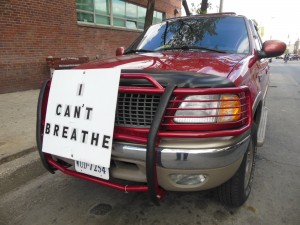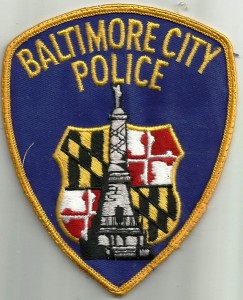In the matter of Freddie Gray the ‘routine’ has vastly changed
(Holding cells at the former Baltimore Police Headquarters – Wikimedia)
During a 40-year career in the news business, I came up with my “two first laws of journalism”:
No. 1 is “Cops Lie.”
No. 2 is “Cops can’t spell.”
I mean no disrespect for officers of the law. I like most cops I’ve met. But I deemed it important for folks in the news business to understand that cops are very much like other folks you meet — they do not always tell the truth or get things right.
Face it — everybody lies. Maybe not all the time, but sometimes. And who hasn’t made a spelling error? The point is to understand that information you are being given may not be accurate or true. Journalists have an obligation to check facts and get other points of view. Truth can be elusive, perhaps not even possible to ascertain.
I learned about cops lying — or perhaps not telling all the truth — as a young police reporter at The Baltimore Sun nearly half a century ago. A tactical squad sergeant invited me to go along on drug investigations and raids with his team of about half a dozen men. But I had to make a deal with the devil. I might witness some activities that I had to agree not to report in my story.
The first such incident came as the cops were trying to locate a drug dealer, and leaned on his mentally slow brother-in-law for information, stopping by the man’s tiny street-level apartment in pre-urban renewal South Baltimore. They told the man he faced arrest for drug possession and, to his denials, got him to agree to a search of his dwelling. As they rummaged around, one of the officers planted a packet of powder under a lamp, then “found” the supposed drugs. The guy was scared. And then, to avoid arrest, he told the team where to find his brother-in-law’s drug stash nearby.
That was a little deception, a warrantless search — a shakedown, really — at the expense of a simple-minded citizen of Baltimore to get what they wanted. And it was part of the investigative process that I was bound by our agreement not to report.
Which brings us to Pennsylvania Avenue, in 1969 an epicenter of illegal drug activity — and this week, an epicenter of the protests over the strange death in police custody of Freddie Gray.
It was another investigation here by the squad, this time with a search warrant for a building that had a padlocked front door. Two men sitting on folding chairs on the sidewalk in front of that building were detained, while the squad broke open the padlock and began combing through a 3-foot-deep heap of trash piled inside. They found, at the bottom of a trash can under the pile of debris, a plastic bag containing filled drug capsules.
Neither of the suspects resided in the building, and neither had a key to the padlock. Neither was holding drugs. They had been sitting in chairs on a public sidewalk. And they were charged with possession with intent to distribute narcotics.
In the official report on their arrest on drug charges, the cops wrote that the men were “on the premises.”
As distasteful I deemed their deception in the case of the feeble-minded brother-in-law, which I was unable to recount in my story, I realized in the Pennsylvania Avenue arrests that the cops were lying in their official report — and this time, I was free to write the circumstances of the search and arrests, and quote from the official report by the police that the suspects had been “on the premises.”
They were not in jail very long. Defense lawyers noted my first-hand account as proof that the men had been outside the premises — not on the premises.

I asked the sergeant about that, and whether the men his team had arrested were in fact guilty. “They were dealing drugs, Dave,” was the sergeant’s reply. “Maybe not there, but they were drug dealers.”
“On the premises” was an example of using vague language to avoid the truth. It was so routine that the cops hardly saw it as lying.
Which brings us, 46 years later, to the death of 25-year-old Freddie Gray, whose arrest on April 12 was partially recorded on video — just the last seconds, in which he was shown face-down on a sidewalk, a cop on either side of him, and then, seeming unable to walk, dragged to the back of a prisoner transport van. He was shouting in apparent pain.
Police reported that Gray had been “arrested without incident.”
It is a phrase so routine, perhaps the officers themselves could not see it as untrue. From their point of view, Gray’s arrest was routine. He had made eye contact with them, then ran, and he was chased, caught, handcuffed and loaded into the van. That’s what they do.
But it was hardly routine for Freddie Gray, whose short life was marred by childhood exposure to lead dust in his mother’s cheap rental home and later a long rap sheet of drug arrests.

Sometime between eye contact and Gray becoming unresponsive and not breathing, his spinal cord had been snapped. He died a week later.
The death became Baltimore’s Missouri Moment — its turn in the global spotlight, with angry demonstrations following deaths at the hands of police in Ferguson, Mo., New York City and other communities. Charm City, one of the local and usually ludicrous nicknames, is under a State of Emergency and occupied by National Guard soldiers after the demonstrations grew into a riot of looting, burning and violence.
Later this week, police promise a fuller report on Gray’s arrest and death as the department turns over the investigation to the Baltimore state’s attorney’s office — the prosecutorial arm of the criminal justice system. Meanwhile, six police officers involved with the arrest and transport of Freddie Gray remain suspended with pay.
And key questions from a period of some 30 minutes remain unanswered — starting with what was the “probable cause” for Freddie Gray’s arrest. The joke, of course, is that he was simply “running while black.” And how could his spinal cord have snapped? Before that bystander’s video began, did an officer have a knee resting on Gray’s neck? Left unattended and without a safety restraint in the caged confines of the transport van, was he given a “rough ride” to the police station?
Nothing here is simple, other than the public response to deaths at the hands of or in custody of police in a nation that has changed, remarkably, since the 1960s.
What once was routine is anything but.
(This article first appeared in David M. Ettlin’s blog The Real Muck.)

David M. Ettlin is a Baltimore native, and a graduate of Baltimore City College (Class of ’63), and what are now Baltimore City Community College and Towson University. He decided against a teaching career after getting a newsroom job in 1967 at The Baltimore Sun newspapers, and retired in 2007 as night metropolitan editor. A Pasadena resident since 1981, he posts occasional tales at his blog, The Real Muck.

